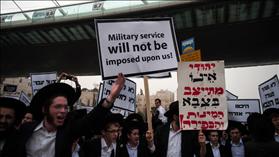The following are four questions related to the new draft law in Israel.
Four questions and answers about the draft law
An analysis of the much-debated haredi draft law.
Uri Regev 03/07/2018 13:29
Tags: draft bill · ultra-Orthodox · IDF

Ultra-Orthodox protest in Jerusalem (AFP Photo / David Buimovitch)
Originally posted at the Jerusalem Post
1. Should the draft law be opposed?
Definitely. The new law severely violates the principles of equality and national solidarity, and it undermines state security. It offers too little, too slowly, and it is too political. It pays lip service to equality, but it was designed mainly to fool the High Court of Justice, while surrendering to the ultra-Orthodox parties’ demand that any yeshiva student who does not want to serve will not be required to.
It defines “haredim” (ultra-Orthodox) in a way that includes those who were already obligated to enlist, such as those who are no longer haredi, and even includes those who have never been haredi.
Further, no less seriously, it would implement a racist policy, as the heads of Sephardi institutions have rightly pointed out, for this law would result in mostly Sephardi youth being drafted into the military, rather than Ashkenazim.
2. But it includes sanctions!
It includes talk of sanctions, but not real and effective sanctions. It’s the right direction – to replace the illusion of criminal sanctions with economic sanctions, but the language of the bill reflects only wishful thinking and rhetoric.
First, the law sets “recruitment targets” for the entire haredi segment of society and does not obligate individuals. Personal sanctions cannot be imposed on those who do not want to serve; the bill allows only for the reduction of government funding for most yeshivot.
Second, the sanctions would be imposed only in the fourth year after the law takes effect, which will be under the next government.
Third, the threat of sanctions would be actualized only if the minimal recruitment targets are not met to a shameful extent, including (as mentioned) the recruitment of non-haredim. And, of course, the next coalition government can simply change these targets.
Finally, anyone who claims that the law also contains criminal sanctions, in that the law would be canceled and all yeshiva students would be liable for service if they do not meet 85% of the targets for three consecutive years, ignores the fact that this clause could be implemented only seven or eight years after the law comes into effect. This means (at least!) another two governments from now! Does anyone seriously think that the Israeli political system will successfully reverse the mass draft dodging of yeshiva students by recruiting all of them, without enacting another legislative “compromise” along the way?
3. If the law does not pass, the government will fall, so how can one expect the coalition not to yield to the demand of the ultra-Orthodox parties?
Most of the public, including the voters for the non-haredi parties in the coalition, want a civil government without the ultra-Orthodox parties. This is a necessary condition for the realization of Israel’s identity as a Jewish and democratic state.
That’s just the point. The extortion by the haredi parties, contrary to the will of most of Israel’s Jewish public, does damage to almost all aspects of public and private life, as Hiddush has shown throughout the years in its regular, periodic public opinion polls and analyses. Hundreds of thousands of citizens cannot marry, and many more are forced to marry via the Chief Rabbinate against their will. The economy is in danger of bankruptcy, according to the Finance Ministry, due to the refusal of yeshiva students to integrate into the labor market. Gender equality is constantly under threat. The government’s Sabbath prohibitions provoke public protests, and the prohibition on public transportation on Shabbat mainly disadvantages the weak, the young and soldiers. The gates of conversion into the Jewish people remain closed. The government acts against the interests of Diaspora Jewry, and so forth.
Most of the public, including the voters for the non-haredi parties in the coalition, want a civil government without the ultra-Orthodox parties. This is a necessary condition for the realization of Israel’s identity as a Jewish and democratic state. It should also be emphasized that the law severely undermines security, it places a higher value on the blood of yeshiva students than on the blood of other citizens, and it flies in the face of the principle of a “people’s army.”
All of this justifies a major change in politics and the establishment of a government that does not depend on the haredi leadership, but, rather, responds to the will of the general public and realizes the basic values of the State of Israel, as set forth in its Declaration of Independence.
4. Does Israel need haredim in the military at all?
Yes! This is what the heads of the IDF have been saying for years. This is a necessary condition for shortening the long terms of service that the other sectors of the population bear. In the 18-23 age group (that’s the only relevant demographic because haredim receive a complete exemption after the age of 24!), there are more than 40,000 draft dodgers. About 15% of Israelis eligible for conscription every year are not conscripted, because “Torah is their profession.” Approximately 27% of first-graders among Israel’s Jewish population are enrolled in haredi schools – and the number is growing. This continued capitulation and waiving of the burden for yeshiva students is a betrayal of the welfare of the state and of the public good; it undermines state security; and it gives us cause to weep for generations!